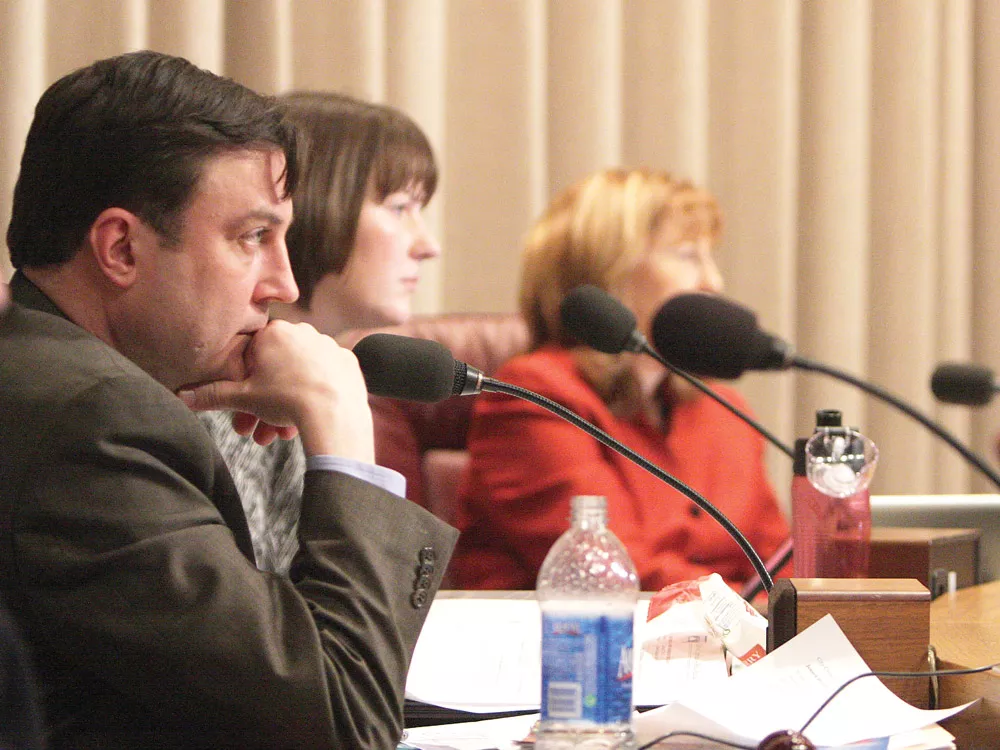It's the end of January, and Spokane’s newly sworn-in City Council has gathered for an all-day retreat in a fluorescent-lit conference lair in the basement of City Hall.
Sitting around a long table, the council members, casually dressed, lob ideas back and forth in what could pass for a painfully long college discussion. Each declares their personal political goals on giant sheets of paper and prioritizes them with stars drawn with colored marker. Figuring out a balanced budget. Offering a more palatable water-rates plan that still raises money for needed repairs. Reforming the police.
The discussion shifts to how they can possibly get all this done.
And the idea of execution leads to another discussion, one that cropped up on the campaign trail: How can the council assert its authority in city politics?
Ideas abound. The council should have a seat at Mayor David Condon’s budget process, if only to stay informed, says Councilman Steve Salvatori. The council needs to see the budget sooner, several council members agree. And they need the ability to make their own decisions independent of city staff and the mayor’s office. That means making sure they draft a counterproposal when Condon offers his new water-rates proposal.
“I don’t think the city is best served when there’s one leader,” Council President Ben Stuckart says, articulating one of his successful campaign’s platforms. The council needs to act more independently, he says, to create tension between themselves and Condon’s office. “That’s why people elect city council members: to be leaders, too.”
Stuckart is a fount of energy. He spends much of the retreat bouncing between ideas, focusing and clarifying them as he goes along. But in an interview last week with The Inlander, he talked like a constitutional scholar.
“If you have tension between two branches of government, then you find a compromise … coming from two different angles, that’s for the betterment of the citizens,” he says.
Stuckart says he believes that if earlier councils had been more independent-minded, police reforms discussed in the wake of Otto Zehm’s death at the hands of police, as well as in response to former Office Karl Thompson’s conviction, would have occurred sooner.
“Had the legislative branch been more active, we might have seen the reforms that we’re pushing now happen five years ago,” he says. “Sometimes the administration gets caught representing the [city] employees” instead of citizens.
The council
took that step Monday night, unanimously approving a resolution that
supports, among other things, body cameras for police officers, the
expedited release of internal police-report records and the restoration
of independent investigative authority to Spokane’s police ombudsman.
According to Councilwoman Nancy McLaughlin, Mary Verner gave the City Council a late-breaking budget choice in her first year as mayor: Pass a tax increase or cut $4 million in new spending. On a tight deadline to approve the budget, the council couldn’t reach a consensus.
The increase passed. Examples like that are why the City Council this year is trying to become more independent of the mayor’s office and city administration, McLaughlin says.
“One of the biggest frustrations with the council — instead of being proactive on the issues, we are being reactive,” says McLaughlin, the longest-serving member of the council, as she sits in the council briefing room in the basement of City Hall. “It makes us feel like we are being led at times, rather than us being leaders when it comes to the legislative process.”
The idea of having a say during Mayor Condon’s budget process came from Salvatori, who is new to the council. He brought it up during a brainstorming session on what issues the council thought were most important this year. Given the economic downturn that has dampened city revenues, and the fact that the city is obligated by the state to balance its books every year, the budget is a big deal.
McLaughlin is less sure about the council having a seat at the mayor’s budget process.
“It depends upon who you send to that table on behalf of the council,” she says. It also might be difficult for one council member to keep the other six informed of the process, she adds.
The city in 2013 is sure to face a budget shortfall — it used onetime monies to balance the current year’s budget, according to Marlene Feist, the city’s spokeswoman. There are currently no projections as to the size of that shortfall.
But council members want to crunch their own numbers. They hired their own budget analyst, though that analyst must balance the needs and requests of all the council members, according to McLaughlin. At their retreat, council members said they’d like even more resources for independent research, rather than depending on city employees.
“If we feel like there might be a different take on a particular issue. … Is this, you know, really the only outcome that there is? Is this coming from the administration?” McLaughlin asks. “Not so much as questioning, but to be reassured we’re getting the best information possible.”
Council members are also pushing to get the proposed budget earlier in the year. Verner last year handed the council her final budget proposal at the end of October, giving members less than two months to digest a general fund budget of $165 million. Stuckart says he’d like to see the mayor’s budget by May, and possibly even hold hearings into the workings of some departments.
“Either we need to be at the table when the budget’s created, so that we’re part of that process,” he says, “or we need to get the budget early enough in the year so that we have time to dig in for seven or eight months.”
Feist says it’s unlikely a council member will sit on the mayor’s budget committee — because there is no “magic budget committee.” Instead, the budget is crafted though meetings both large and small. She adds that the Verner administration kept council members up to date throughout the year on her budget progress.
Condon, according to Feist, is working to get a budget to the council earlier than October, possibly by August.
But former Councilman Bob Apple, a longtime advocate for reform at City Hall, says an earlier budget proposal will never happen, despite the current council’s insistence.
“Every council says that, and then the mayor always obliges and says, ‘Yes, we’ll try to get it to you by June, we’ll try to get it you by September,’” Apple says. “It’s great lip service, but it doesn’t really work.”
Apple, who was term-limited out last year after serving eight years, is also skeptical about council plans to assert themselves on budget matters. He says that unless members threaten to lay off employees or derail contracts, they won’t achieve independence.
“I’ve
never seen the council say, ‘We’re going to cut these people from our
budget if you don’t correct [this]. … They literally have to take action
to make something happen,” says Apple. “Always the words, the talk,
never the commitment.”
But to realize their hopes of becoming more independent, the new council will first have to learn to work together.
On Monday night, the council split down the middle, showing its fissures and the challenge of seven people trying to speak as one voice independent from the mayor’s office.
Newly elected council members Steve Salvatori, Mike Fagan and Mike Allen joined Councilwoman Nancy McLaughlin in a vote to reject a firefighter’s union contract that had been negotiated under Verner. The negotiations must now restart or go through mediation and possibly a court-decided binding arbitration. This vote aligned with Condon’s preference to renegotiate the contract.
Stuckart, along with the remaining council members, Jon Snyder and Amber Waldref, quickly sent out a statement disagreeing with the vote.
“The
contract is a good deal for the city,” the statement reads. “A
rejection of this agreement creates too much risk for the city.”


















